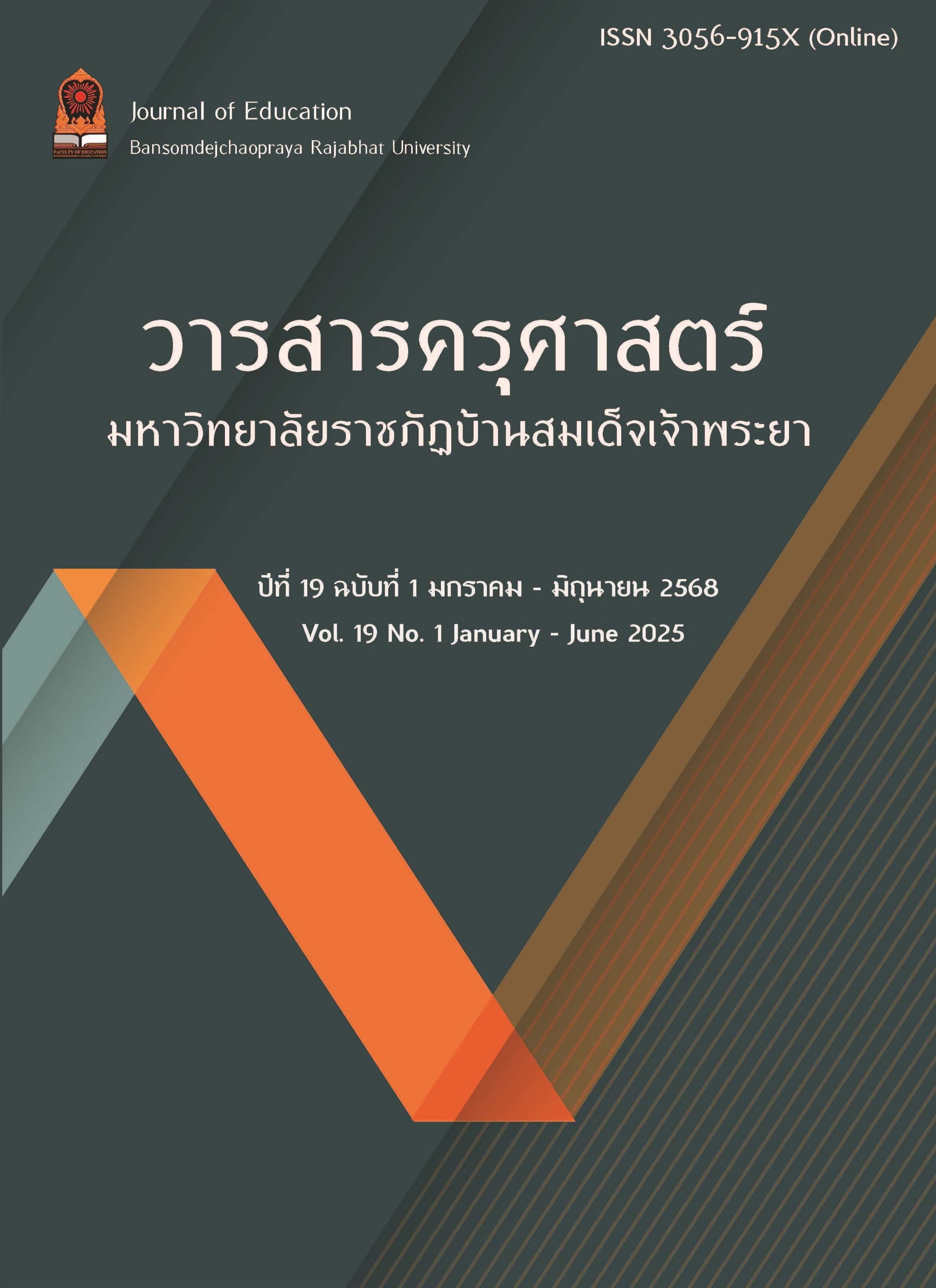The development of mathematics learning activity packages based on the concept of active learning manaegment to promote the problem-solving skills of grade 3 students
Keywords:
active learning approach, mathematics learning activities, problem-solving skills, student satisfactionAbstract
This research aimed to: 1) develop a set of mathematics learning activities based on the active learning approach to enhance problem-solving skills; 2) study the effects of using the mathematics learning activities based on the active learning approach on students’ problem-solving skills; and 3) examine students’ satisfaction toward the implementation of the developed activities. The sample consisted of 35 Grade 3 students from Ramkhamhaeng University Demonstration School (Elementary Level), academic year 2023, selected through cluster random sampling. The classroom was mixed-ability and had no statistically significant differences in mathematics achievement among sections. The research instruments included: 1) the developed set of mathematics learning activities based on the active learning approach to enhance problem-solving skills; 2) lesson plans based on the active learning approach; 3) a problem-solving skills test; and 4) a student satisfaction questionnaire. Data were analyzed using a one-group t-test to compare pre- and post-learning outcomes and descriptive statistics (mean and standard deviation) for students’ satisfaction.
The findings were as follows:
1. The developed mathematics learning activities demonstrated an efficiency (E1/E2) of 83.04/81.29, which met the predetermined criterion of 80/80.
2. Students’ mathematics problem-solving skills after learning with the developed activities were significantly higher than before the intervention at the .05 level
3. The students’ satisfaction with the mathematics learning activities was at a very high level.
Downloads
References
กระทรวงศึกษาธิการ. (2560). มาตรฐานการเรียนรู้และตัวชี้วัด กลุ่มสาระการเรียนรู้คณิตศาสตร์ วิทยาศาสตร์ และสาระภูมิศาสตร์ในกลุ่มสาระการเรียนรู้สังคมศึกษา ศาสนา และวัฒนธรรม (ฉบับปรับปรุง พ.ศ. 2560) ตามหลักสูตรแกนกลางการศึกษาขั้นพื้นฐาน พุทธศักราช 2551. กรุงเทพฯ: โรงพิมพ์ชุมนุมสหกรณ์การเกษตรแห่งประเทศไทย.
ฒิชากร ปริญญากาญจน์ และศิริวรรณ วณิชวัฒนวรชัย. (2562). การพัฒนาชุดกิจกรรมการเรียนรู้ร่วมกับการจัดการเรียนรู้แบบร่วมมือด้วยเทคนิค TAI เพื่อพัฒนาผลการเรียนรู้เรื่องการบวก และ
การลบเลข ของนักเรียนชั้นประถมศึกษาปีที่ 2. วารสารศึกษาศาสตร์ มหาวิทยาลัยศิลปากร, 17(2), 115–128.
ทิศนา แขมณี และบังอร เสรีรัตน์. (2563). การจัดการเรียนรู้ฐานสมรรถนะเชิงรุก. กรุงเทพฯ: สำนักมาตรฐานการศึกษาและพัฒนาการเรียนรู้ สำนักงานเลขาธิการสภาการศึกษา.
ทิศนา แขมมณี. (2565). การใช้การเรียนรู้เชิงรุกในระบบการศึกษาไทย. วารสารการศึกษาวิจัย, 15(3), 98-112.
นภาพร เนียมสุข, และสุภัทรา คงเรือง. (2024). การพัฒนาชุดกิจกรรมการแก้ปัญหาทางคณิตศาสตร์โดยใช้รูปแบบการเรียนรู้ซิปปาโมเดลร่วมกับเทคนิค เค ดับเบิ้ล ยู ดี แอล สำหรับนักเรียนชั้นประถมศึกษาปีที่ 2 สำนักงานเขตพื้นที่การศึกษาประถมศึกษา พระนครศรีอยุธยา เขต 1. วารสารสันติศึกษาปริทรรศน์ มจร, 12(6), 2429-2442.
มลิวัลย์ โพธิมณี, เยาวเรศ ใจเย็น และวิวัฒน์ เพชรศรี. (2024). การพัฒนาชุดกิจกรรมการเรียนรู้โดยใช้กระบวนการ แก้โจทย์ปัญหาของโพลยาร่วมกับเทคนิคการวาดรูปบาร์โมเดล เรื่องเศษส่วน เพื่อส่งเสริมความสามารถ ในการแก้ปัญหาทางคณิตศาสตร์ สำหรับนักเรียนชั้นประถมศึกษาปีที่ 5. วารสารสหศาสตร์ศรีปทุม ชลบุรี, 10(2), 113-127.
วิษณุ ทรัพย์สมบัติ. (2565). สรุปผลการประเมินคุณภาพผู้เรียน (NT) ชั้นประถมศึกษาปีที่ 3 ปีการศึกษา 2564. เข้าถึงได้จาก https://www.facebook.com/100064688979214/posts/372888754 877421/
พิมพันธ์ เดชะคุปต์. (2563). Active learning การเรียนรู้เชิงรุก: จากแนวคิดสู่การปฏิบัติ. กรุงเทพฯ: โรงพิมพ์แห่งจุฬาลงกรณ์มหาวิทยาลัย.
สถาบันส่งเสริมการสอนวิทยาศาสตร์และเทคโนโลยี. (2551). ทักษะ/กระบวนการทางคณิตศาสตร์. กรุงเทพฯ: ส เจริญ การพิมพ์.
Santos, R., Santiago, A., & Cruz, C. (2024). Problem Posing and Problem Solving in Primary School: Opportunities for the Development of Different Literacies. Education Sciences, 14(1), 97.
Downloads
Published
How to Cite
Issue
Section
License
Copyright (c) 2025 Faculty of Educaion Bansomdejchaopraya Rajabhat University

This work is licensed under a Creative Commons Attribution-NonCommercial-NoDerivatives 4.0 International License.
บทความที่ได้รับการตีพิมพ์เป็นลิขสิทธิ์ของคณะครุศาสตร์ มหาวิทยาลัยราชภัฏบ้านสมเด็จเจ้าพระยา
ข้อความที่ปรากฏในบทความแต่ละเรื่องในวารสารวิชาการเล่มนี้เป็นความคิดเห็นส่วนตัวของผู้เขียนแต่ละท่านไม่เกี่ยวข้องกับมหาวิทยาลัยราชภัฏบ้านสมเด็จเจ้าพระยา และคณาจารย์ท่านอื่นๆในมหาวิทยาลัยฯ แต่อย่างใด ความรับผิดชอบองค์ประกอบทั้งหมดของบทความแต่ละเรื่องเป็นของผู้เขียนแต่ละท่าน หากมีความผิดพลาดใดๆ ผู้เขียนแต่ละท่านจะรับผิดชอบบทความของตนเอง



